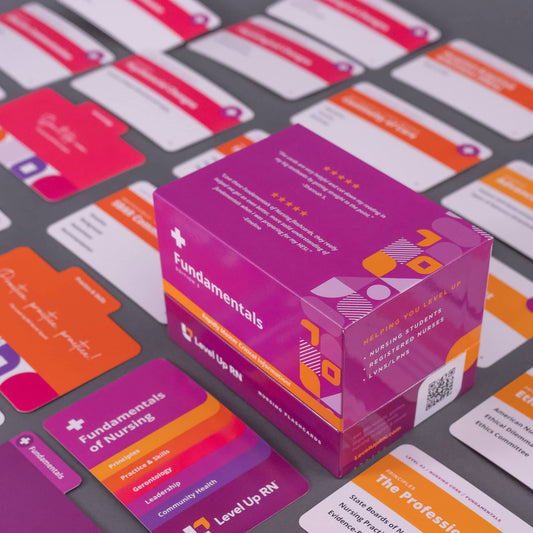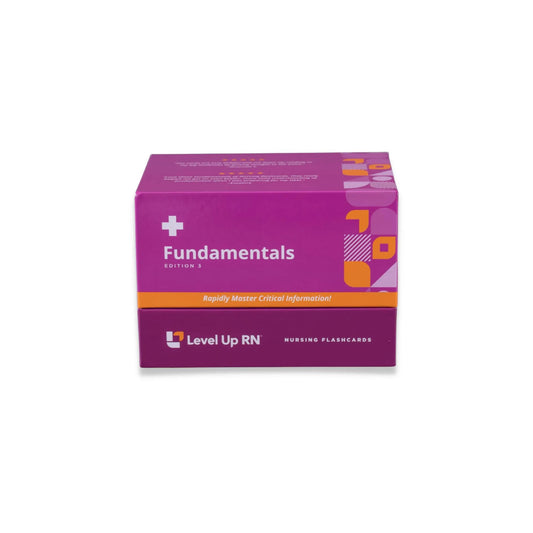- 0:00 What to Expect from Delegation
- 00:33 Delegation
- 4:39 Unlicensed Assistive Personnel (UAPs)
- 7:35 Practical Nurses (LVNs/LPNs)
- 10:37 Quiz Time
Fundamentals - Leadership, part 3: Delegation
Updated: Meris Shuwarger
Full Transcript: Fundamentals - Leadership, part 3: Delegation
Full Transcript: Fundamentals - Leadership, part 3: Delegation
Hi. I'm Meris. And in this video, I'm going to be talking about delegation as an RN to unlicensed assistive personnel, such as CNAs and techs, and delegation to licensed practical or vocational nurses. I'm going to be following along with the flash cards from the leadership section of our fundamentals deck. If you have these cards already, I would go ahead and invite you to pull them out and follow along with me. And if not, of course, you can get these cards on our website, leveluprn.com. All right. Let's get started. So what is delegation? Delegation is when you give a task to somebody else for them to complete. So for instance, as a nurse working in the emergency room, there are a lot of tasks that I frequently delegate. And these are tasks like getting an EKG. I am fully capable of getting an EKG. That's within my scope. However, it's also within the scope of the licensed practical nurse and the unlicensed assistive personnel at my facility. So I can be doing tasks that are RN-only tasks, like giving medications, when my patient needs an EKG. And then that way, we can cluster care, and my patient can get all of that care at once, and it's going to help things move more smoothly.
Now, let's talk about the different rights of delegation. So there are five rights of delegation. The right task, the right circumstance, the right person, the right direction, and the right supervision. Let's go over what that means. So the right task means you have to delegate stuff that can be delegated. So for instance, I cannot delegate that IV push medication to anybody other than asking another RN if they can help me. I can't delegate that task to a practical nurse or an unlicensed assistive personnel. So only delegate tasks that may be delegated. And again, remember that this is not only pursuant to your state laws about scopes of practice but also to your facility policy, okay? For instance, in my emergency room, I work with paramedics, paramedics who work for the hospital. Their scope of practice is much larger outside of the hospital than it is in our facility. So they cannot do everything that they can do in the field. Very important to know your policies and procedures. Now, when we're talking about the right circumstance, this means think about the context. Is my patient unstable? I'm not going to probably have the tech get that EKG on my patient having 10 out of 10 crushing substernal chest pain radiating down the left arm. They're gray. They're diaphoretic. I need to be doing that EKG. First of all, I should be at that bedside. I need to be able to immediately look at that EKG and alert the doctor. So don't delegate tasks if it is not the right circumstance, if the context is not right.
The right person. So this means I need to be able to delegate this task to a person who is able to complete it. So again, I cannot ask my LPN to do a task outside of their scope. They're not the right person for that. Or if we think about-- maybe I have a PO med, an oral med that I really could use help giving. I'm really tied up. I'm swamped right now. I can't delegate that to the UAP, to the CNA, or the tech. That's outside of their scope, but I can delegate it to the LPN or the LVN. So always think about, is this the right person to delegate the task to?
Right direction. So this means I need to tell them what I'm expecting of them when I need it done, to report back to me. I need to give them those sorts of expectations. For instance, if I'm going with the EKG example, okay, "Hey, would you be willing to grab an EKG on bed 25? It's a STAT EKG. If you could, just grab that really quick. When you're done, if you would, bring that EKG to the doctor and let me know when you have completed it," that is giving them the direction of how I need you to complete this task. And then lastly, the right supervision. The RN who delegates the task is responsible for evaluating the outcome of that task. So for instance, if I just delegated that EKG, it is my job to ensure that it has been done and done in the manner that I instructed. It is not the job of the UAP or anybody else, another RN, etc. It is the job of the RN who delegated that task.
So next, we're going to talk about delegating tasks to the unlicensed assistive personnel. And before I even get into these next two cards, I want to remind you that it is the state who sets the scope of practice for UAPs and practical nurses. So although I'm going to give you some information that are considered general guidelines on what can and cannot be delegated, it is up to you to know the laws of your state and to know your facility's policies. So let's get into delegating to unlicensed assistive personnel, such as CNAs, techs, PCAs, whatever your facility might call them. So here are some tasks that are within their scope of practice, meaning that you can delegate them, personal care, such as hygiene, bathing, dressing, feeding patients, unless they are on swallow precautions, okay, a big important thing to know there, toileting needs, repositioning, all of that within their scope of practice. CPR, if your UAP is CPR certified, absolutely, you can delegate CPR to them, fall prevention, ambulation, all within their scope of practice.
And then basic skills, such as routine vital signs, the big important word here being routine, so these are scheduled vitals, the Q4, Q8 vitals, not vital signs because your patient has a change in status or the initial admission vital signs, right? It's going to be important that you remember that if you are doing assessment vital signs, those cannot be delegated. Obtaining weight and height, reporting changes to the licensed provider like the RN, so this doesn't mean that they've assessed the patient. It means that they went in to get vitals, and they said, "Hey, he's not looking so good. He's really short of breath." That will be reported to the RN. It is now their job to assess the patient. Noninvasive specimen collections, such as a urine specimen collection and charting I and O's, intake and output, so if the UAP goes in and empties the Foley, they are the one who should be charting how much they emptied. That is all within their scope of practice. Now, things outside of their scope of practice, medication administration, we are not administering any medications as UAPs. We don't have a license to do that. Wound care cannot be delegated to a UAP. And then insertion, removal, or use of invasive items, such as an IV catheter, an enema, Foley catheter-- again, remember that these are general guidelines because I can already hear some of you saying, "But at my facility, we could start Foleys." I know. I know. We're talking generally, no invasive device use, insertion, maintenance, etc.
Now, what about the practical nurse? What about your LVNs or your LPNs depending on what state you're in? Now, these are nurses. They just have a different scope of practice from a registered nurse. And again, it is important that both the vocational or practical nurse and the registered nurse know what their scope of practice is. So here are some things within the scope of practice of a LPN or an LVN: administration of most medications and enteral feedings, wound dressing changes - that's different from the UAP; I would know that - insertion, removal, and maintenance of invasive items, such as catheters, IVs, enemas, etc., tracheostomy care, reinforcement of teaching after the RN has done the initial teaching, okay? We can reinforce teaching as an LVN or an LPN. We can't do the initial teaching. Now, similarly, an LVN or an LPN may assess the patient, but they cannot do the initial assessment, okay? So that is outside of their scope of practice. So if you are working in the ER, triaging a patient, that is an initial assessment. If you're working on the floor, the initial admission assessment cannot be delegated to an LPN or LVN.
Creation of nursing diagnosis or care plan cannot be delegated. Administration of IV medications, depending on state laws-- again, remember, it's all based on scope of practice in your state. In my state, for instance, I can delegate IV fluids, IV antibiotics. I cannot delegate any IV push medications or drips that are things like cardiac drugs. I can't have an LPN be my cosign for heparin or insulin drips, things like that. LPNs also cannot do administration of blood products or chemotherapy, super-duper important to know. And they cannot take verbal orders from the provider. So those are some things outside of their scope of practice. We do have a cool chicken hint here at the bottom that says, "Only RNs can EAT," E-A-T, which stands for evaluate, assess, and teach. So if you are thinking about what can I delegate and what can't I? Is it a teaching thing? Is it an evaluation or an assessment? You need to be doing that as the RN and, of course, those other little things that are outside of scopes of practice, like blood administration, etc. Again, I just want to remind you for the last time, this is all based on where you work and in which state you work. So these are some general guidelines, but make sure that you are paying attention to the policies, procedures, and state laws where you work.
All right. Are you ready for some quiz questions to test your knowledge? Because I sure am. Here we go. What are the five rights of delegation? Right task, circumstance, person, direction, and supervision. When delegating a task, who is accountable for evaluating the outcome of that task? The delegating RN. Which of the following is not appropriate to delegate to the UAP: CPR, charting I and O's, applying topical ointment, or ambulating a patient? All of these tasks may be delegated to the UAP except for applying topical ointment, as this is a medication which must be administered by the nurse. Which of the following is not appropriate to delegate to the LPN: administration of PO lorazepam, triage of a patient arriving to the ER, Foley catheter insertion, or wound dressing changes? All of these tasks may be delegated to the LPN except for triage of a patient arriving to the emergency room because this is an initial assessment.
All right. That is it for this video covering delegation topics. I hope you learned something. Leave me a comment if there's anything that you use to remember these things that's different than what I taught you. I would love to hear it, and I know everybody else would as well. I'll see you in the next one. Thanks so much and happy studying.


